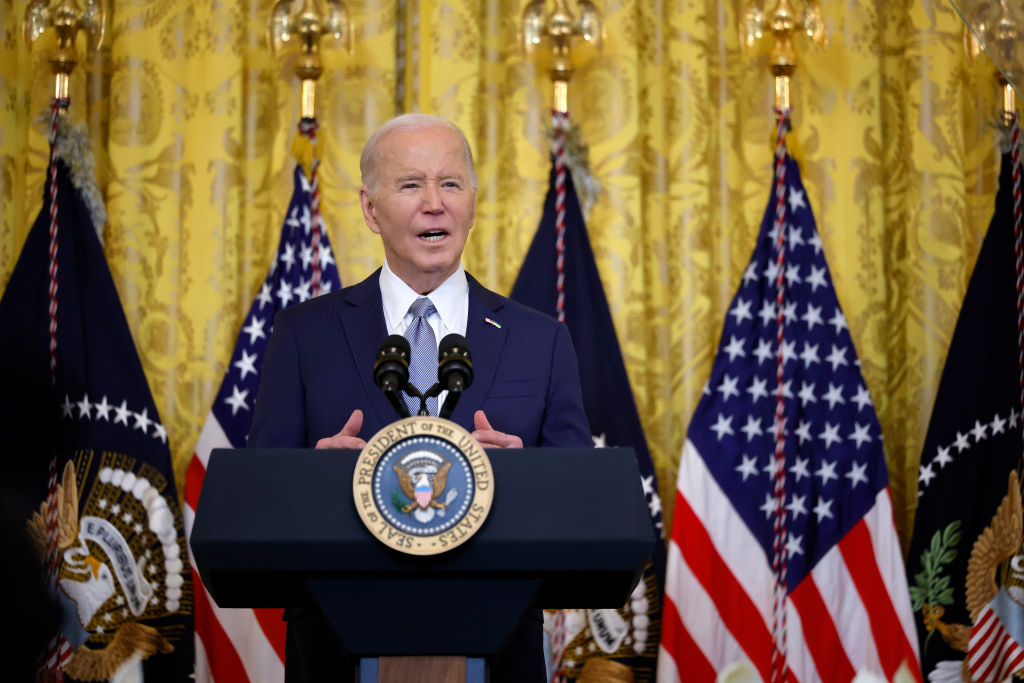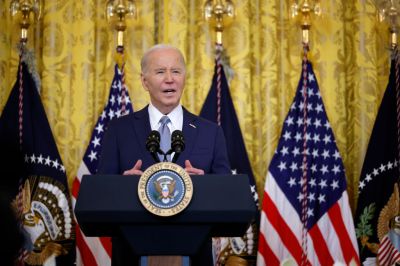The Wall Street Journal reports that Americans spent $1.3 billion on bottles of ranch dressing last year, even more than we did on old, reliable ketchup.
But even all that dressing wouldn’t be enough to cover the steady discharge of word salad put out by the White House. Not just this White House, but every administration going back decades. Bales and bales of leafy verbiage on every topic imaginable, chopped and served up by a platoon of underlings.
Consider Friday’s proclamation on National Donate Life Month, which began this week. At a well-tossed 804 words, the document is supposed to read like President Joe Biden sat down with pen in hand to share his thoughts. “I often say that we are a good Nation because we are a good people,” it begins. They were going for Lincolnesque and ended up with ChatGPT.
Of course, Americans understand that our presidents don’t write these things. Nor, I suspect, would they want them to. “Bibi, I’ve got to put the finishing touches on the Cesar Chavez Day proclamation. I’ll call you back.”
This is no knock on organ donation, nor agricultural laborers for that matter. The good, important work of organ and marrow donation goes on year-round. April, however, is a great time for advocates to focus their energies on public education, and a presidential proclamation is a fine peg on which to hang that concerted effort. Biden even has a bit of a track record he can point to as a friend of the effort. But it’s not the words from the White House that do it.
The United States has observed National Donate Life Month since 2003, which has been dutifully marked by each administration. The statements have tended to get longer (the Bush White House got it done with fewer than half of the words needed by the team this year), but it’s all basically the same fluff.
But that’s probably not the presidential proclamation from Friday that you’ve been hearing about. Nor the one for Cesar Chavez. Nor for Care Workers Recognition Month. Nor the Month of the Military Child.
You’ve instead been hearing about the equally platitudinous proclamation for Transgender Day of Visibility, in which the White House put Biden arm-in-arm with the “LGBTQI+ community” in acknowledging the international observation.
The reason you’ve heard about it is that the proclamation has now completed a full orbit of the blazing sun of facileness and imbecility that burns brightly at the center of our political solar system.
Even without the specifics, which are too tedious for me to repeat here, you know the well-rehearsed pattern of pouncing and counter-pouncing: Ignorant (or willfully ignorant) people level false claims with great umbrage, then the targets of that umbrage respond with even greater indignation at the accusations. Then it’s time for controversies within the controversy—until the story has been pumped of what little substance it has ever had and becomes only about how so-and-so felt about the feelings of so-and-so. And so on, and so on. Until they’re down to the dregs of news adjacency. And then they just keep pumping.
You can like or dislike the fact that every year, the Biden White House cranks out some pandering pap about his commitment to transgender “visibility.” But no one could say that trans Americans are invisible.
Something like 0.6 percent of American adults identify as being transgender, which would be about 1.5 million people, roughly the size of the population of Philadelphia. I don’t know about you, but it seems like the amount of coverage devoted, pro and con, to transgenderism isn’t in even rough relation to the number of transgender people. Some of that is because the numbers are growing, but a lot of that is about titillation. Stories about sex and sexual identity tend to do better than stories about, say, Philadelphia. And then there’s that predictable orbit of umbrage and the revenue from clicks or contributions such topics can so reliably generate.
Donald Trump’s first proclamation as president was to declare the day of his own inauguration as National Day of Patriotic Devotion. Unlike a lot of presidential proclamations, this one actually sounded like it might have come from the man himself, at least the branding. The designation lacked an article, not “a National Day,” just, wham, right into it. Very James Austin Johnson. Plus, they filed the paperwork late. And the “dear leader” energy? 10/10.
If one wanted to, he or she could have gotten very exercised about it. Very. Just as one could have about Trump’s subsequent declaration of Loyalty Day, and ended up with egg on his or her face.
Or, we could mostly ignore the surplus verbiage that all presidential administrations churn out, day after day, year after year. Words have never been cheaper to produce and distribute, and this lexicological inflation has dramatically reduced the value of what we put into circulation.
The Hertz car rental agreement, at 8,592 words, is almost twice as long as the Constitution. Though, to be fair, Gouverneur Morris and the boys didn’t tell us anything about cleaning fees if we smoked inside any of the three branches.
And yet, here I am using all of these words to talk about a story that I’m also telling you isn’t worth talking about. But I hope you’ll forgive me, because this five-day journey to nowhere was just too perfect an example of what I mean when I tell you that the news business is broken and how that dysfunction continues to wreck our politics.
And if you didn’t like it, just dip this column in a little ranch dressing. It can cover a multitude of sins.







Please note that we at The Dispatch hold ourselves, our work, and our commenters to a higher standard than other places on the internet. We welcome comments that foster genuine debate or discussion—including comments critical of us or our work—but responses that include ad hominem attacks on fellow Dispatch members or are intended to stoke fear and anger may be moderated.
With your membership, you only have the ability to comment on The Morning Dispatch articles. Consider upgrading to join the conversation everywhere.